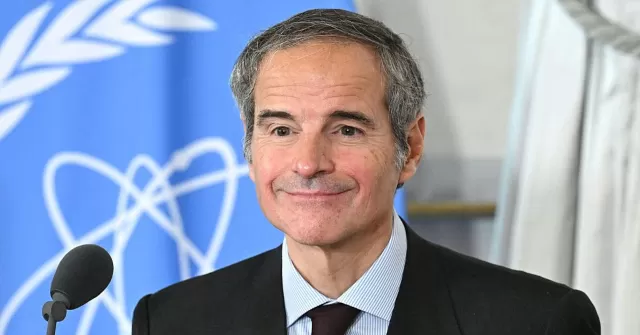The International Atomic Energy Agency (IAEA) has confirmed that the recent U.S. airstrike on Iran’s heavily-fortified uranium enrichment plant at Fordow has rendered it “no longer operational”. This news comes as a huge blow to Iran’s nuclear program and a major victory for the international community in their efforts to prevent the spread of nuclear weapons.
IAEA Director-General Rafael Grossi made the announcement on Thursday, stating that the airstrike has caused “enormous damage” to the centrifuges at the Fordow facility. This is a significant development as Fordow was one of Iran’s most heavily fortified nuclear sites, buried deep underground to protect it from potential attacks.
The U.S. airstrike, which was carried out in response to Iran’s continued violations of the 2015 nuclear deal, targeted the centrifuges used to enrich uranium at the Fordow facility. These centrifuges are crucial in the process of producing highly enriched uranium, which can be used to make nuclear weapons.
The IAEA’s confirmation of the destruction of these centrifuges is a clear indication that the U.S. airstrike was successful in its mission to disable Iran’s nuclear program. This is a major victory for the U.S. and its allies, who have been working tirelessly to prevent Iran from obtaining nuclear weapons.
The U.S. airstrike has also sent a strong message to Iran and other countries that the international community will not tolerate any attempts to develop nuclear weapons. It serves as a warning to Iran that any further violations of the nuclear deal will not be taken lightly and will be met with swift and decisive action.
The IAEA’s confirmation of the damage caused by the airstrike also highlights the importance of the agency’s role in monitoring and verifying Iran’s compliance with the nuclear deal. The agency’s inspectors have been on the ground in Iran, closely monitoring its nuclear activities and ensuring that it adheres to the terms of the deal. This latest development is a testament to the effectiveness of the IAEA’s work and the crucial role it plays in maintaining global nuclear non-proliferation efforts.
The U.S. airstrike has not only dealt a significant blow to Iran’s nuclear program, but it has also sent a strong message to the international community that the U.S. is committed to upholding its responsibilities as a global leader in preventing the spread of nuclear weapons. It is a clear demonstration of the U.S.’s determination to use all necessary means to ensure the safety and security of the world.
The success of the U.S. airstrike also highlights the importance of international cooperation in addressing global issues such as nuclear proliferation. The U.S. worked closely with its allies to gather intelligence and plan the airstrike, showcasing the strength of international partnerships in tackling complex challenges.
In the wake of this development, it is crucial for all parties involved to continue to work together to ensure that Iran does not restart its nuclear program. The IAEA must continue to closely monitor Iran’s nuclear activities and report any violations to the international community. The U.S. and its allies must also remain vigilant and ready to take action if necessary to prevent Iran from obtaining nuclear weapons.
In conclusion, the confirmation by the IAEA that the U.S. airstrike has disabled Iran’s centrifuges at the Fordow facility is a significant achievement in the fight against nuclear proliferation. It is a clear indication that the U.S. and its allies will not hesitate to take action to protect the world from the threat of nuclear weapons. This development also highlights the crucial role of the IAEA in monitoring and verifying compliance with the nuclear deal. It is a victory for international cooperation and a step towards a safer and more secure world.

